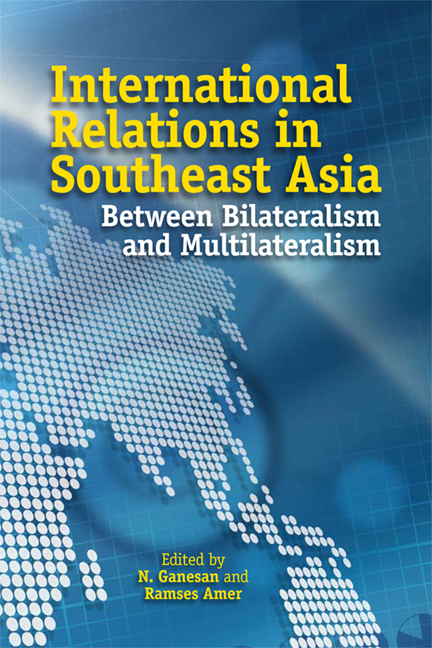Book contents
- Frontmatter
- Contents
- Preface
- List of Abbreviations
- Contributors
- Introduction
- Part I On International Relations
- 1 Multilateralism, Regionalism, and Bilateralism: Conceptual Overview from International Relations Theory
- 2 Southeast Asian International Relations: Is There Institutional Traction?
- Part II Case Studies — Mainland Southeast Asia
- Part III Case Studies — Maritime Southeast Asia
- Conclusion
- Index
1 - Multilateralism, Regionalism, and Bilateralism: Conceptual Overview from International Relations Theory
from Part I - On International Relations
Published online by Cambridge University Press: 18 November 2017
- Frontmatter
- Contents
- Preface
- List of Abbreviations
- Contributors
- Introduction
- Part I On International Relations
- 1 Multilateralism, Regionalism, and Bilateralism: Conceptual Overview from International Relations Theory
- 2 Southeast Asian International Relations: Is There Institutional Traction?
- Part II Case Studies — Mainland Southeast Asia
- Part III Case Studies — Maritime Southeast Asia
- Conclusion
- Index
Summary
The different chapters in this volume discuss different dimensions of bilateralism and multilateralism in Southeast Asia. Unfortunately, definitions of these particular forms of international cooperation and competition abound and different meanings can be attached to them. This terminological variance can hinder our understanding of the phenomena under study. This chapter attempts to provide a general overview of some basic concepts underlying this collaborative project as they have been dealt with in the international relations literature. Arriving at common definitions is not always easy but, at a minimum, the effort can help raise awareness of different interpretations of concepts across contexts. At best, the adoption of consensual terminology can help carry out a more convergent set of empirical studies, with a potentially more robust set of propositions and findings.
I provide an outline of seven core concepts as they have been used in representative literature in international relations: multilateralism, multilateral/regional institutions, regionalism versus regionalization, networks, forum shopping, and bilateralism. This literature spans security and political economy. Both can inform the discussion in several ways. First, the seven mentioned concepts may have been applied to one realm (economics, for instance) in the academic literature but often spilled over into the other (security). Gauging the utility of core concepts across issueareas can provide important insights and extend our understanding of their distinct operation and meanings in each case. Second, in the real world of international politics, considerations of security and political economy are joined at the hip, in Southeast Asia and beyond. Third, it is important to understand whether the substantive evolution of multilateralism, regionalism, or any of these concepts tends to follow any sequential logic, so that economic bilateralism may beget security bilateralism, or vice-versa. These synergies are too important to disregard both in the conceptual literature and in empirical studies. Examples from ASEAN and the Asia-Pacific will be weaved through the conceptual discussion in this chapter.
- Type
- Chapter
- Information
- International Relations in Southeast AsiaBetween Bilateralism and Multilateralism, pp. 3 - 36Publisher: ISEAS–Yusof Ishak InstitutePrint publication year: 2010

